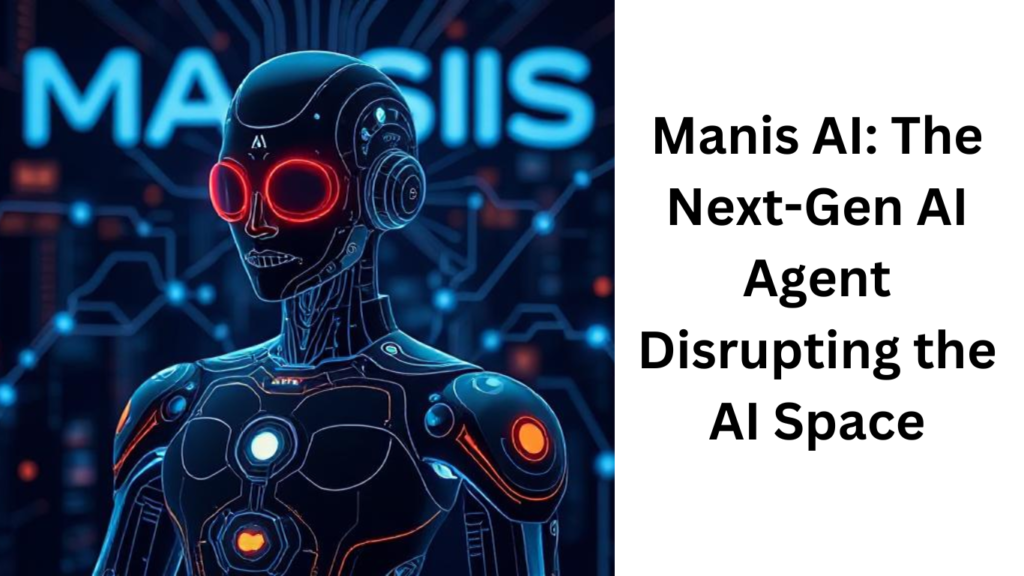Manis AI: The Next-Gen AI Agent Disrupting the AI Space

Introduction
Artificial Intelligence (AI) is advancing at an unprecedented rate, and the latest entrant making waves is Manis AI – a general AI agent developed in China. This AI system has demonstrated remarkable capabilities, rivaling OpenAI’s Deep Research and Operator models, excelling in multiple tasks including resume screening, financial analysis, lead generation, and automated research.
As AI competition intensifies, companies like Microsoft, OpenAI, and emerging players like Manis AI are pushing boundaries. In this blog, we will explore how Manis AI is shaking up the AI space, its unique capabilities, the rising costs of AI agents, and the new breakthroughs in AI architecture like the Belief State Transformer (BST) that could redefine the future of AI.
1. What is Manis AI?
Manis AI is a next-generation AI agent designed to handle a broad range of tasks autonomously. Developed in China, it has positioned itself as a strong competitor to OpenAI’s Deep Research, showcasing advanced reasoning, data analysis, and automation capabilities.
Unlike traditional AI chatbots, Manis AI functions as an intelligent AI assistant capable of handling multiple workflows simultaneously, making decisions, and providing actionable insights based on user requests.
2. How Manis AI Works: Key Features and Use Cases
Manis AI is designed to perform a variety of complex tasks, making it a valuable tool across multiple industries. Here are some key features and applications:
Key Features:
- Autonomous Workflow Management – Handles tasks independently, minimizing human intervention.
- Asynchronous Processing – Can work in the cloud, allowing users to close their devices and receive updates once tasks are completed.
- Memory and Learning Capabilities – Remembers previous instructions and improves performance over time.
- Integration with APIs and Web Tools – Connects with third-party applications to pull and analyze data effectively.
Use Cases:
✅ Resume Screening: Analyzes and ranks resumes, extracting key qualifications. ✅ Financial Analysis: Pulls stock market data, analyzes trends, and provides reports. ✅ Lead Generation: Scrapes business data from various sources to generate qualified leads. ✅ Automated Research: Filters and compiles information on real estate, market trends, and product comparisons. ✅ Comparative Analysis: Reviews and contrasts insurance policies, investment opportunities, and more.
3. Manis AI vs OpenAI’s Deep Research
A direct comparison between Manis AI and OpenAI’s Deep Research highlights some fascinating insights:
- Performance: Manis AI has outperformed Deep Research in several complex research-based tasks, providing more comprehensive and detailed reports.
- Speed: OpenAI’s Deep Research is faster, completing analyses in about 15 minutes, whereas Manis AI takes about 1 hour to process the same workload.
- Report Quality: Manis AI generates longer, more in-depth reports (up to 21,000 words) compared to Deep Research’s 12,000-word reports, offering more hypothesis generation and insights.
- Cost-Effectiveness: If Manis AI can scale efficiently, it may offer a competitive alternative to OpenAI’s expensive AI models.
4. The Costly Future of AI Agents
AI services are becoming increasingly expensive. OpenAI is introducing AI agents with fees reaching $20,000 per month, and some high-end AI tools even cost $220,000 monthly.
SoftBank has reportedly committed $3 billion to purchasing OpenAI’s AI agents, believing they can replace top-tier financial and research analysts. However, the affordability of these AI solutions will determine their adoption. Manis AI’s emergence could drive competition, making AI tools more accessible and cost-effective for businesses and individuals.
5. What is the Belief State Transformer (BST)?
One of the most exciting advancements in AI is Microsoft’s Belief State Transformer (BST), a new approach to improving AI’s reasoning and planning capabilities.
How BST Works:
- Unlike traditional AI models, BST predicts both future and past tokens, allowing for better decision-making.
- It enhances AI comprehension, making it more effective in complex, multi-step tasks.
- In benchmark tests, BST significantly outperformed standard AI models in planning and logical problem-solving.
With AI systems like Manis AI and Microsoft’s BST-powered models, we may see a new era of AI capable of autonomous decision-making and in-depth reasoning.
6. How AI Competition Benefits Businesses and Consumers
The rise of Manis AI and Microsoft’s increasing AI investments signal a competitive AI industry, bringing both opportunities and challenges.
Impact on Businesses:
✅ Lower Costs: Increased competition may lead to more affordable AI solutions. ✅ Smarter Automation: AI-driven automation will streamline business processes. ✅ More AI Choices: Businesses will have multiple AI providers to choose from, reducing reliance on a single entity like OpenAI.
Impact on Consumers:
✅ Better AI-Powered Tools: Chatbots, research assistants, and automation tools will become more advanced and user-friendly. ✅ Faster Decision-Making: AI tools will help individuals and businesses process and analyze information quicker. ✅ Ethical Considerations: As AI adoption grows, discussions on data privacy, security, and ethical AI use will become even more crucial.
FAQs
1. What is Manis AI?
Manis AI is a general AI agent that can perform research, financial analysis, resume screening, lead generation, and more.
2. How does Manis AI compare to OpenAI’s Deep Research?
Manis AI generates longer, more detailed reports but takes longer to process data compared to Deep Research.
3. How much does OpenAI charge for its AI agents?
OpenAI’s AI agents start at $10,000-$20,000 per month, with premium models reaching $220,000 per month.
4. What makes the Belief State Transformer (BST) unique?
BST allows AI to plan and predict outcomes more effectively, improving its reasoning and problem-solving skills.
5. Will AI replace human jobs?
AI will automate many routine tasks, but human creativity and oversight will remain essential.
6. What industries can benefit from AI agents like Manis AI?
AI agents are useful in finance, business, research, customer service, marketing, and automation.
7. Is Microsoft still using OpenAI?
Microsoft is developing its own AI models, reducing its dependence on OpenAI while still maintaining a partnership.
8. How can businesses use Manis AI?
Businesses can use Manis AI for data analysis, lead generation, research, and automating repetitive tasks.